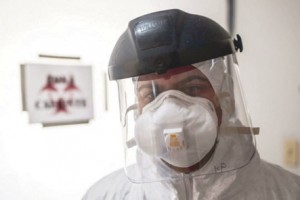Originally published in UTEP Magazine, Winter 2015
By Nadia M. Whitehead

Three layers of latex gloves, bright white head-to-toe coveralls and a face piece with a personal respirator are all that stand between LT. Jose Garcia, Ph.D., and a virus that has killed more than 7,500 people.
As a U.S. Navy scientist based in Liberia – the West African country hardest hit by the past year’s Ebola epidemic – Garcia comes in direct contact with hundreds of contagious samples every day. For the last three months, he has diligently tested blood samples of locals living in Monrovia to see if they are carrying the virus. The work is part of the U.S. military’s effort to help contain Ebola’s spread.
“My parents are very proud of the work I am doing over here,” the 30-year-old University of Texas at El Paso alumnus said. “Of course, mothers and fathers will always worry about their children going into harm’s way, but they are reassured by the fact that I am out here for a reason; my team’s skill sets are desperately needed now more than ever here in Liberia.”
Before Garcia and the small team of scientists were deployed in October, health workers waited up to seven days for test results. Now, the process takes just under five hours, allowing doctors to treat infected patients earlier and quickly separate them from those who are not infected.
“Jose is a prime example of the quality of our graduate school program,” said Manuel Llano, Ph.D., associate professor of biological sciences.
At UTEP under Llano’s guidance, Garcia studied HIV and earned a doctoral degree in pathobiology. Garcia graduated in 2010 and went on to conduct postdoctoral work at The Scripps Research Institute before being commissioned in the Navy.
He never imagined his science career would take him to Liberia, but he was glad he could put his skills to service.
“UTEP played a pivotal role in my overall growth as a scientist,” Garcia said. “It was in Llano’s lab where I developed the foundation of my scientific training, without which I would have never been able to do the incredible things that I have done so far.”
After a 12-hour shift in the lab – a three-bedroom home that sits beside an Ebola Treatment Unit – Garcia prepares to wind down. Before removing his coveralls, he is doused with bleach. Then, his one-time-use suit is incinerated.
Unless his deployment is extended, Garcia’s days will continue like so until he completes 90 days of service. The Department of Defense has stated they will begin to reduce the number of personnel in West Africa once Ebola case numbers begin to drop and display a consistent downward trend.